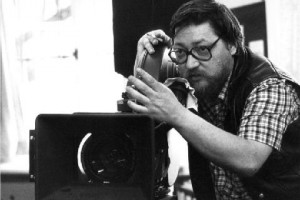The Fassbinder Legacy
When I moved over from blogger to WordPress, I lost track of a number of posts I had prepared — & just now, via a false maneuver, came acroos them as WordPress had imported them with everything else. Most of them are of course out of date & useless, but a few seem worthwhile posting. Here’s the first one of these:
If Wim Wenders & his work always felt very close to me — we both dropped out of medical school to take up our differing arts in the early sixties, we both were majorly influenced by America & its space & music & films (and shared a great friendship with Samuel Fuller through whom I was able to meet Wenders in the early eighties in Paris), and while he was filming Paris, Texas, I was translating Sam Shepard’s Motel Chronicles on which that movie is based, & published it in the SIXPACK series of books I was editing at the time for Christian Bourgois Editeur in Paris — despite all this it was the other German film maker of that generation, Rainer Werner Fassbinder who has over the years fascinated me more, maybe exactly because of the profound differences in outlook and aesthetics. He died twenty five years ago [26, now] at the age of 36 — having made 36 films during his working life, among them three or four of the greatest post-WWII European movies, as well as one indisputable television masterpiece (Berlin Alexander Platz — the best translation of a novel into film I know of). Fassbinder’s legacy has not been simple and here are a some links to articles on those problems — worthwhile checking out if Fassbinder is important to you:
Only now have we discovered a report from Die Welt Online about the Fassbinder Foundation controversy. “On Wednesday, a group of 25 former Fassbinder co-workers, including actors, directors and producers demanded that Juliane Lorenz resign as head of the Rainer Werner Fassbinder Foundation. And that the entire Fassbinder oeuvre be handed over to the Deutsche Kinematek in Berlin. The petition was signed by directors Werner Schroeter and Walter Bockmayer, actors Ingrid Caven, Peter Kern and Udo Kier as well as Fassbinder’s long time co-director and producer, Michael Fengler. See our interview with Ingrid Caven on the Fassbinder legacy.


 Poasis II: Selected Poems 2000-2024
Poasis II: Selected Poems 2000-2024 “Todesguge/Deathfugue”
“Todesguge/Deathfugue” “Interglacial Narrows (Poems 1915-2021)”
“Interglacial Narrows (Poems 1915-2021)” “Always the Many, Never the One: Conversations In-between, with Florent Toniello”
“Always the Many, Never the One: Conversations In-between, with Florent Toniello” “Conversations in the Pyrenees”
“Conversations in the Pyrenees” “A Voice Full of Cities: The Collected Essays of Robert Kelly.” Edited by Pierre Joris & Peter Cockelbergh
“A Voice Full of Cities: The Collected Essays of Robert Kelly.” Edited by Pierre Joris & Peter Cockelbergh “An American Suite” (Poems) —Inpatient Press
“An American Suite” (Poems) —Inpatient Press “Arabia (not so) Deserta” : Essays on Maghrebi & Mashreqi Writing & Culture
“Arabia (not so) Deserta” : Essays on Maghrebi & Mashreqi Writing & Culture “Barzakh” (Poems 2000-2012)
“Barzakh” (Poems 2000-2012) “Fox-trails, -tales & -trots”
“Fox-trails, -tales & -trots” “The Agony of I.B.” — A play. Editions PHI & TNL 2016
“The Agony of I.B.” — A play. Editions PHI & TNL 2016 “The Book of U / Le livre des cormorans”
“The Book of U / Le livre des cormorans” “Memory Rose Into Threshold Speech: The Collected Earlier Poetry of Paul Celan”
“Memory Rose Into Threshold Speech: The Collected Earlier Poetry of Paul Celan” “Paul Celan, Microliths They Are, Little Stones”
“Paul Celan, Microliths They Are, Little Stones” “Paul Celan: Breathturn into Timestead-The Collected Later Poetry.” Translated & with commentary by Pierre Joris. Farrar, Straus & Giroux
“Paul Celan: Breathturn into Timestead-The Collected Later Poetry.” Translated & with commentary by Pierre Joris. Farrar, Straus & Giroux
Considering your lifelong work on Celan, this post on Fassbinder, Gunter Grass’s piece in the New Yorker about his time in the Waffen SS and Anselm Kiefer’s work, what’s your take on Germany’s need to confront its Nazi past? Having grown in Alsace, this was always a tenuous subject whenever it was talked about in history class. It was even more bizarre when I went on an exchange program in Bremen and visited Böttcherstrasse, where Ludwig Roselius’s contribution to the decaffeination process was mentioned, but not his support for the Nazi party.
Best,
A fellow med school dropout
With each Fassbinder film I see I love his work more (I’ve probably seen half). Odd in a way nobody else’s work has been–that soap-ey surface to so many of the films. A lot of it has to do with the fact that the acting is better than in (maybe) anybody else’s work; these are long-time collaborators who began as theater practicioners in a fascinating “what now, after Brecht?” setting.
Unsurprising to see scandal still erupting about the fellow.
This is quite characteristic. How things are really created, in their messy contingencies, and their institutionalizing afterwards. So all stories, to be taken with a grain of salt.
My favorite Fassbinder movie -The American Soldier (as opposed to My American Friend?).
Ciao,
Murat
Pierre,
I had a dream very important to me at one time in which Fassbinder appeared. Later I realized, “fast binder” was the pun his name contained in the dream.He was at the bottom of the sea. So, liberation was releasing the Fassbinder in me. For years I watched his films obsessively.
Ciao,
Murat
as Penelope Cruz to Almodovar, so Hanna Schygulla to Fassbinder.